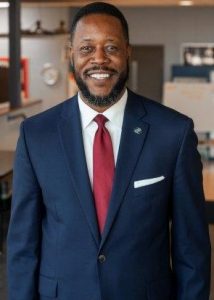
Dr. Dred Scott
President and CEO, Boys and Girls Clubs of Greater Kansas City
Throughout his more than 20-year career devoted to serving youth, Dr. Dred Scott has served as Educator, Principal and Executive Director of Support Services. Prior to his current role as President of the Boys and Girls Clubs of Greater Kansas City, Dr. Scott served as Deputy Superintendent for the Independence (MO) School District (ISD). Dr. Scott also serves on the Truman Medical Center Board of Trustees, the Drumm Farm Center for Children Board of Directors, the Jackson County Children’s Community Services Fund Board of Directors and the Community Services League Board of Directors.
Who is a Black hero or heroine that has motivated you in your career? / Who are you celebrating this Black History Month?
Joe Lewis Clark, famed principal of Eastside High School in Paterson, New Jersey is someone who motivated me in my career, especially in my early years of school leadership. This month I am celebrating Black leaders who have recently passed (Cecily Tyson and Hank Aaron). I am also discovering new Black History makers, such as author Ta-Nehisi Coates and poet Amanda Gorman.
How has the history of Black and African American people in Kansas City impacted the work that you do?
I am a life-long Kansas City resident, so I have had ample opportunity to observe the absolute best of Black History in Kansas City and some of the worst. I recognize the beauty in Black culture and wish it were more widely appreciated and accepted. We have added a great deal to the fabric of this city.
Great civic leaders, such as Bruce R. Watkins and Emanuel Cleaver II, have been great advocates for African Americans in Kansas City, they had an ability to perceive the needs of the people they were representing, and were unapologetic about it. They made sure that the cries that had previously been unheard were heard at the right level and in meaningful ways – and they were able to create purposeful systems of support. Learning from these leaders, among others, has inspired me to always stay connected to the past: I have prided myself in staying true to my roots and my community, and making sure I go to bat for them every day. The rich history of this city and its Black people is an inspiration to the work that I do in paving the way for the next generation to achieve at higher levels than those that came before them.
What is the most essential work that must be done to ensure equity for Black students in Kansas City?
We must ensure that universal Pre-K is a reality for all Black students in Kansas City. Providing consistent and quality early learning experiences for all is our best first step in addressing education equity issues.
I have witnessed the consequences of disparity in early learning at every point of my career – the “30-million-word gap” between Black three-year-olds and their affluent counterparts has long been discussed, but the real-world implications of this manifests itself daily throughout our city. In my second year as Principal at Eastwood Hill Elementary a veteran Kindergarten teacher pulled me aside to report that one of her students had never seen, held, or interacted with a book before entering the classroom. This conversation stuck with me throughout my career, and the notion that students who do not have access to quality early learning opportunities will never catch up to their peers is what makes universal Pre-K for Black students so essential.
Secondly, a passionate and highly trained education work force is imperative. Our students deserve teachers who are masters of their craft who believe in the ability of their students beyond what reality may be telling them. Representation matters a tremendous amount for Black students, but the most important influence on any student an educator who is passionate, dedicated, and highly trained.
What is a cause or organization that you would encourage KC citizens to research this black history month?
The Porter House KC, an inner city based co-working community that provides entrepreneurship access and resources to underserved populations in the Kansas City Metro area.

